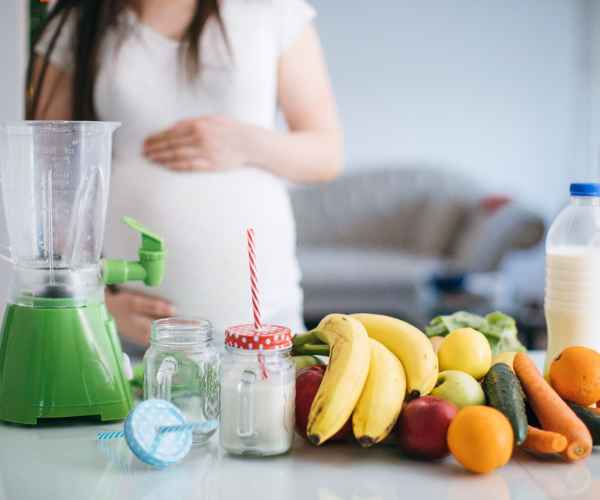Preparing for a Healthy Pregnancy
Pregnancy Journey:
Pregnancy is a beautiful phase in a woman’s life, and each of the three periods of pregnancy has its special nutritional demands that should help the woman and her baby. Accurately determining the type and amount of nutrient-dense foods that should be consumed during pregnancy will aid in the prevention or control of some symptoms such as nausea and fatigue. A diet with an emphasis on folic acid, protein, and calcium should be consumed in the first, second, and third stages to lower the chances of developing complications and supporting growth and development. Think of it as building a foundation: this means that with each meal, you are introducing your baby to vital nutrients that are necessary for his or her growth and development as well as your own.
Taking a pregnancy diet by the trimesters makes it easier for you to feed the baby and your body appropriately for the different stages of pregnancy. Every trimester, the needs change, and it is important to take a combination of vitamins, minerals, and energy-containing foods to enable you to get the best and give your baby the best start in life. It also ensures that you have energy, strengthened immunity, and prevents unwanted weight gain – all very crucial during the pregnancy period.

Why It Matters:
Dietary requirements also vary with each of the three trimesters of pregnancy to support the growth of the baby and the demands made on the body. In the first trimester, folic acid, vitamin B6, and iron are especially important for the development of the neural tube and brain. The second trimester is characterized by an increased need for calcium and iron for blood formation and bone growth, respectively. During the third trimester, the baby continues to grow at a rapid rate, thus enhancing your caloric and protein needs for growth. Meeting these needs can avoid deficiencies that can harm you and your baby’s health during pregnancy.
For instance, a study conducted by the American Pregnancy Association states that taking a proper diet decreases the chances of developing complications such as preeclampsia, gestational diabetes, and anemia due to iron deficiency. All of these conditions may affect the pregnancy outcomes in some ways. Improved diet during pregnancy is also associated with better birth outcomes, including weight, fewer problems, and potentially a decreased likelihood of health issues later in the child’s life, including obesity and type 2 diabetes.
Holistic Health:
Nutrition impacts the body, but it also affects emotions and the mind. A healthy diet can prevent one from feeling drained and moody, thus promoting mental strength during a phase that is also physically and emotionally tough. For example, eating whole grain carbohydrates, which are complex carbohydrates, provides a constant supply of energy and can assist in controlling mood swings that are common in pregnant women.
Nutrient-dense foods also aid in fighting most of the symptoms such as nausea, tiredness, and even fluid retention, especially in the morning. Foods high in calcium and magnesium, for instance, green leafy vegetables, can assist in avoiding muscle twitches and leg pains, while high-fiber foods (fruits and vegetables) aid in digestion, a frequent problem in pregnant women, such as constipation. On the emotional level, worrying about what one is eating and being aware of the baby’s improvement makes the woman feel spiritually in tune with herself, which is a big boost to the experience of pregnancy.
An integrative view toward nutrition also enhances the overall health of the body and can promote the spiritual well-being of a pregnant woman, making her feel more rooted and anchored while eating clean.
This First Trimester of Pregnancy (1 to 12 weeks) is All About Laying the Foundation.
Nutrient Needs during the First Trimester of Pregnancy
Eating during the first trimester is all about fueling the body in a way that will best allow for the growth of the fetus in its early stages. In the first few weeks, the diet should consist of foods that contain folic acid, vitamin B6, and iron. These nutrients are very important in the prevention of neural tube defects, normal development of the brain and spinal cord, and increased blood volume during pregnancy.
Neural tube defects can be reduced by 70% if women take folic acid before and during early pregnancy. This vitamin is present in spinach, whole grains, and prenatal vitamins and is crucial for the initial development of the fetus. Learn how vitamin B6 can be used to alleviate nausea and vomiting, one of the early pregnancy symptoms. Some sources include bananas, nuts, and lean meats. On the same note, iron helps in the development of more blood and can be found in fortified cereals, beans, and dark leafy vegetables.
Personal Experience:
For instance, I had a problem getting enough nutrients in the first trimester of my own pregnancy because of nausea. This did the trick: eating small, frequent meals that contained nutrients. I took a lot of whole grain foods, dairy products, and foods rich in iron such as fortified bread. For example, I would have a pack of dried apricot (rich in iron) with me and consume them when I could.
The Truth about the First Trimester of Pregnancy
One of the misconceptions that are often heard is that a pregnant woman should ‘eat twice as much,’ but it is much more important what she is eating. The first trimester doesn’t require the consumption of additional calories; instead, it is recommended to consume foods rich in nutrients. Normal foods like sweet potatoes that are rich in vitamin A, or taking a glass of orange juice that has vitamin C, are good examples of foods that contain nutrients without many calories. It is better to concentrate on the quantity of food you are consuming and take only natural and fresh products instead of the packaged ones.
There are also misconceptions about caffeine consumption and which seafood is okay for consumption. For instance, caffeine should be avoided or taken in moderate quantities, and up to 200mg daily (equivalent to a 12-ounce coffee) is considered harmless. Also, seafood that is rich in Omega-3 fatty acids, such as salmon, should be taken occasionally during the week because these fatty acids are essential in the development of the brain in early childhood.
Some Important First Trimester Diet Tips and Tricks to Have a Healthy Pregnancy
It is difficult to have a balanced diet during the first trimester of pregnancy because of morning sickness, cravings, nausea, and constant fatigue. Here are a few practical tips:
- Small, Frequent Meals: To reduce nausea, you should take smaller portions of food several times a day, preferably five to six times a day. Positive foods include crackers, whole grain foods, and high protein foods such as yogurt that are easier to control and give steady energy.
- Stay Hydrated: As little as a two percent loss of body water can enhance the perception of fatigue and nausea. It will be useful to drink water with a piece of lemon inside or choose liquids containing electrolytes. Foods that have high water content like watermelon and oranges are also good for hydration, and they also have vitamins.
- Include Iron-Rich Foods: Iron deficiency can make fatigue worse, so include such foods as cereals fortified with iron, dried fruits, and green leafy vegetables. Ask your doctor to recommend the best foods to eat with the iron-rich foods such as bell peppers and citrus fruits to enhance the absorption of iron.
- Combatting Morning Sickness: A cup of ginger tea, some peppermint, or a piece of toast with a little bit of nut butter can be quite helpful in this case. Various researches have put ginger as an efficient drug in treating nausea, and more than half of the subjects in some of the trials have testified to having benefited from it.
Making use of these tips, most women discover that they are in a position of handling the symptoms and ensuring that they feed themselves and their baby as they progress through early pregnancy.
Third Trimester (27-40 Weeks): Preparing for Baby’s Arrival
The Final Growth and The Immunity Boosting Nutrients
The third trimester is where the body and baby are getting ready for that delivery. Some important nutrients in the final months are crucial for the growth and development of your baby, particularly the brain and the immune system. The nutrients of most importance include vitamin C, fiber, omega-3 fatty acids, and choline during this stage.
- Vitamin C: Essential to the immune system and collagen synthesis, vitamin C enhances the placenta and promotes fetal tissue repair. Some of the best sources are oranges, strawberries, bell peppers, and kiwi fruit. Some studies also reveal that vitamin C has some role in the absorption of iron, which is crucial because the body requires more iron.
- Omega-3 Fatty Acids: Found in fatty fish such as salmon and in plant sources including chia seeds, walnuts, and flaxseeds, omega-3 is critical for brain and eye health. The first and second trimesters are also the best time to start introducing foods rich in omega-3s to support the baby’s developing nervous system.
- Fiber: Since your baby is growing in your stomach, putting pressure on your digestive system, it’s important to continue taking fiber to prevent constipation. Foods that are rich in fiber such as whole grains, fruits, and vegetables are good for digestion because towards the last three months of pregnancy, the digestive system slows down.
- Choline: This nutrient is important in the growth and development of the fetal brain and in preventing neural tube defects. Eggs, lean meats, and fish are good sources of choline; it helps the development of the baby’s brain and the mother’s brain as well.
Personal Anecdote: When I got into the third trimester of pregnancy, I realized that having a glass of orange juice and increased intake of fiber-rich vegetables in my diet was helpful. Orange juice is one of the most natural ways to boost energy, and having a glass of fresh-squeezed orange became a regular thing in my diet.
What You Should Know About Eating During the Third Trimester
When it comes to real life, it is obvious that one can hear a lot of advice that, although it may be recommended by someone’s best friend or a close family member, can be completely unscientific. There are also many misunderstandings about the diet in the third trimester. For instance, hot and spicy food causes preterm labour. Nevertheless, there is no scientific evidence for this viewpoint. It is usually okay to eat spicy foods, although you may have acid reflux if your baby is born, which may be caused by the baby’s growth.
Pay attention to what you think will benefit your body the most. Some people may experience heartburn during pregnancy and thus should avoid spicy foods. It’s always more important to pay attention to eating a well-rounded diet with a selection of different foods, rather than avoiding certain tastes that seem to be associated with weight gain. The bottom line is, you should be able to eat food that is healthy for you and, at the same time, taste good.
Recommended Meals and Diet During the Third Trimester of Pregnancy
In order to have proper nutrition during this period, it is important to include calcium, iron, protein, and healthy fats in the meals. This will help to ensure that you have enough energy for the last growth spurt.
Meal Ideas:
- Breakfast: Greek Yogurt parfait with chia seeds, berries, and nuts. It contains protein, calcium, fiber, and fatty acids for the body.
- Lunch: Spinach and chickpea salad with cherry tomatoes, avocado, and topped off with a dash of lemon juice. Try to include a side of a piece of whole-grain toast for fiber and energy that will last longer.
- Dinner: I had grilled salmon with quinoa, steamed broccoli, and sweet potatoes. This meal is also a good source of omega-3, iron, and vitamin C for the body’s immune system and development.
Diet Tips:
- Calcium-Rich Foods: Calcium can be found in dairy products, fortified plant-based milk, and dark green leafy vegetables such as kale to support bone growth.
- Iron and Protein: Eat lean meat, beans, and lentils to help your blood volume, which rises during pregnancy.
- Healthy Fats and Grains: Whole grain foods such as oats or quinoa combined with nuts or avocado can help to meet energy needs and reduce appetite.
Trimester-Specific Symptoms
Different symptoms are experienced in each trimester, and having a proper diet can help with the discomfort. It is common to have morning sickness in the first trimester, and it may be hard to eat, but eating several times a day with protein can help with nausea. In the second trimester, a woman’s energy begins to rise, and a diet containing adequate calcium and iron is beneficial for the mother as well as the baby. The third trimester may also cause a mother to experience tiredness and problems with digestion, which can be helped with a dietary overhaul and snacking on healthy foods.
Complications and Prevention
Prenatal vitamins, particularly those containing folic acid and iron, as well as a well-balanced diet, may help to prevent complications such as preeclampsia and anaemia. According to research, intake of foods such as green leafy vegetables, fortified cereals, and lean meats are useful in the regulation of blood pressure and in the formation of red blood cells. Approximately 15-30% of women of child-bearing age suffer from iron deficiency anaemia, and this is usually controllable through diet and the help of a doctor.
Medication and Treatment
Foods that are important in fetal growth and development include choline, DHA, and calcium. Visiting a healthcare provider helps one to determine the right dietary needs and the right supplements to take. For instance, DHA is good for the brain, while calcium is good for the bones. According to research, it will be useful for the long-term health of an infant to meet these nutrient levels.
Table of Concerns
A chart showing the macronutrient and micronutrient requirements during each trimester of pregnancy will be useful in planning for meals.
| Trimester | Nutrients to Focus On | Foods to Avoid | Suggested Foods |
| First | Folic acid, Iron, B6 | High-mercury fish | Array of vegetables, grains, and fruits, especially the citrus ones |
| Second | Calcium, Protein, DHA | Unpasteurized dairy | Milk, chicken, fish, eggs, cereals fortified with folic acid and vitamin B12 |
| Third | Vitamin C, Fiber, Choline | Highly processed foods | Eggs, orange juice, and green vegetables |
This table is useful in presenting the needs on a trimester basis to achieve a well-rounded diet for the pregnant woman according to her stage of pregnancy.
FAQs: Answering Common Questions
What should I stay away from as I eat during each of the three trimesters of my pregnancy?
Some foods are not supposed to be taken during pregnancy to enhance the health of the mother and the baby. During the first three months, you should not eat fish with high levels of mercury such as swordfish, consume raw or undercooked seafood, or consume unpasteurized dairy products. Research shows that high levels of mercury can cause damage to the fetal brain, and unpasteurized dairy products may harbor bacteria. Food safety is also important in the second trimester; therefore, it is advisable to avoid them as well as highly processed foods that are not nutritious. In the third trimester, it is better to stay away from foods that can cause heartburn, such as spicy foods, as heartburn becomes more frequent as the baby grows and puts pressure on the stomach.
What can you do to help your body get what it wants while still following a good diet?
Cravings are common during pregnancy and affect between 50-90% of pregnant people. These cravings can be reconciled with a healthy diet by using nutrient-dense foods to meet those cravings. For instance, if you have a sugar craving, you should go for fruit or yogurt but with nuts on top. For those looking for something to crunch on, popcorn or whole grain crackers are a better choice than a bag of chips. It is quite safe to indulge in an occasional treat as long as the main diet consists of normal wholesome food necessary for the body.
Why does a woman’s nutritional requirement fluctuate in every trimester?
Every trimester is a different period of the baby’s development, and each requires certain nutrients to help the baby develop properly. Vitamin folic acid and iron are required in the first trimester for the formation of the brain and development of blood circulation. In the second trimester, calcium and protein become necessary as the baby develops bones, muscles, and organs. Lastly, the third trimester requires omega-3 fatty acids, choline, and vitamin C to support the growth of the baby’s brain, immune system, and overall development. Knowing the needs of your baby through these stages allows you to work on a diet that will meet those needs at that particular stage.
Is it possible to affect my baby’s brain and physical development through my diet?
Yes, studies indicate that a balanced diet containing all the nutrients necessary for the growth and development of the baby’s brain can greatly affect a baby’s brain development. For instance, omega-3 fatty acids, healthy fats found in fish or flax seeds, are used in the growth of the fetal nervous system and its brain. Harvard has emphasized the importance of prenatal nutrition, with a view of understanding the development of the child’s brain. Such nutrients, for instance, choline that is present in eggs and lean meat, improve one’s memory and help prevent neural tube defects.
Are it legal to use supplements such as choline or DHA without a doctor’s prescription?
It is important to know that choline and DHA are good for the baby’s growth; however, it is recommended to seek advice from a healthcare provider before taking any supplement. Choline, DHA, and folic acid are known to help, but the need could be different for each person. Some of the vital nutrients required by women during pregnancy may already be found in prenatal vitamins. Your healthcare provider can determine if you are getting all the nutrition that you require from your diet or if you need supplements.
Conclusion
Pregnancy is a process that changes a woman physically and spiritually. Knowing your nutritional requirements on a trimester basis is crucial in helping your baby grow. Your diet in each of the three trimesters of pregnancy plays a significant role in the growth and development of the baby. During the first trimester, a woman needs folic acid and iron; in the second trimester, calcium and protein; and in the third trimester, omega-3s and choline. Adapting your diet to these new needs will also help you to feel more energetic and fit, plus it’ll be great for your baby’s growth and development.
It is essential to take care of your body during this process; it is always a good idea to speak with a healthcare provider about dieting if you have any concerns at all. Note that the baby is growing inside of you, and it is just as important to take care of yourself during those nine months.
Pregnancy is a strength, a resilience, and a joy. Healthy eating during and after conception and providing your baby with adequate nutrition and loving care forms a strong foundation even before your baby is born. It’s important to cherish this process and feel good about the decisions you are making for yourself and your baby by realizing that every healthy meal you eat is nourishing not only you but your baby as well.






